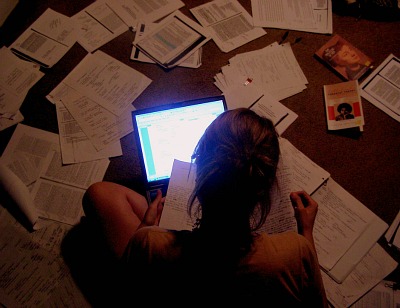
Librarians chatted with host Steve Hargadon during his Search Literacy webinar last week on the best strategies when working with students and research. The bottom line? The need to push them to think beyond the results—and instead examine how they got there.
“If there’s one skill I desperately wish for, it would be that when typing into a search box, we get kids to look at the results,” says Tasha Bergson-Michelson, a librarian and search education curriculum fellow with Google. “Is this what I expected to happen and if not, what credible solution can I use to make it what I expected?”
Bergson-Michelson, along with school library and technology director Jole Seroff and school library media consultant Debbie Abilock, stressed the importance of students thinking outside the search box—and imagining not just how to refine a search but also how to evaluate and then use that information to further their work. That job is not just the responsibility of the school librarian, but all players in a school. And those listening to the webinar agreed, with 51 percent saying that classroom and technology teachers along with librarians all must play a part.
“No one person can teach all areas of research in all disciplines,” says Abilock, a former K–12 school librarian in Palo Alto, CA. “What research looks like in science begins in a very different way than it does in humanities, which begins in a very different way in the arts.”
But all participants emphasized that search literacy must start with evaluation—understanding what students are searching for, as well as how to then use the results. But teaching basic search skills is only part of the process. As Seroff notes, students are best engaged when they’re conducting research for an actual assignment, rather than just put through drills.
“It’s much more meaningful to teach search skills in the context of projects and as students are learning in their classrooms,” says Seroff, director of library and academic technology at Castilleja School, an independent girls school for grades 6-12 in Palo Alto.
Abilock agreed, mentioning that after reading a great book, she doesn’t tell a friend about the wonder of a story and then prove it by creating a diorama. She drew a comparison between that scenario and the checklists students are often required to complete, and how they can distance students from authentic learning.
“There’s this artificiality about them,” says Abilock. “They represent training wheels and at the same time are divorced from the actual process.”
As most educators know, of course, there’s no magic bullet to a great search education. Instead, the magic comes from teaching students how to constantly examine what they want to discover, think about best avenues to get there, and how to evaluate what they’ve uncovered.
“I would like kids to recognize that the information they get is not the information they are left with,” adds Abilock. “That it’s their job to represent that information and that’s what inquiry is all about.”
Photo by outcast104


